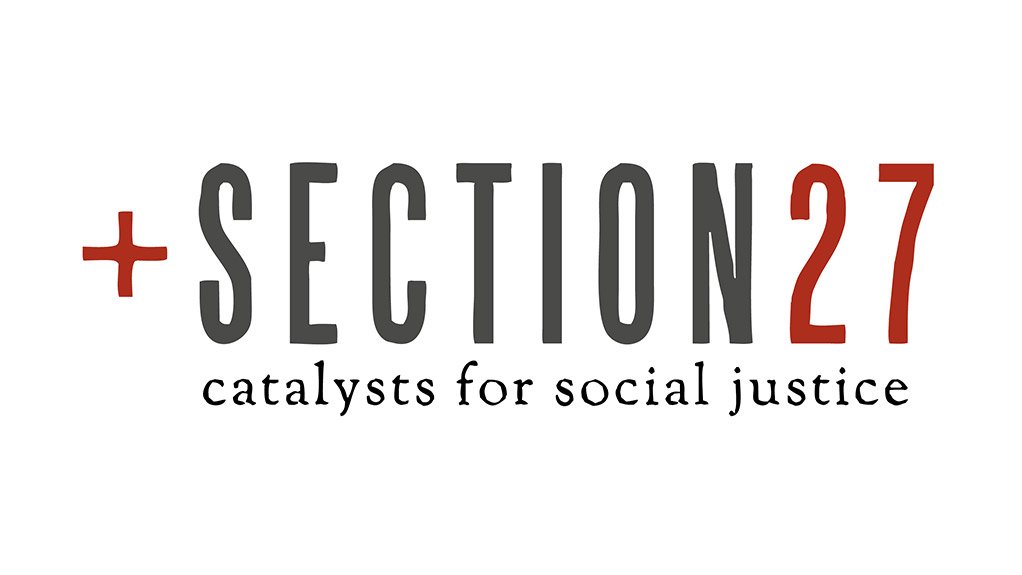/ MEDIA STATEMENT / The content on this page is not written by Polity.org.za, but is supplied by third parties. This content does not constitute news reporting by Polity.org.za.
SECTION27 is concerned that the 2024/25 budget reflects the government's commitment to an aggressive fiscal consolidation path without adequate consideration of the impact on the Constitutional rights to basic education and health care. While the proposed cuts to basic services this year may, on the surface appear less devastating than those presented in Minister Godongwana’s 2023 Medium-Term Budget Policy Statement, this budget will likely further constrain basic education and health care delivery across the country.
Consolidated Basic Education spending has received a 1.7% increase from 2023/24’s R319-billion to R324.5-billion. This translates to R24 191 per learner per annum, a R378.21 increase from last year’s R23 813 in nominal terms. However, if we factor in the effect of a projected CPI-inflation of 4.7% for the 2024/25 period, we may see an actual investment to basic education of about R293.2-billion instead and actual spending per learner of about R21 859, a 3.6% real cut from last year’s real R22 700. This will result in less resources for South African public schools to adequately fund, for example, the provision of scholar transport, stationery, and learning materials.
It is no secret that our country’s public school system struggles with delivering quality education despite historically relatively high investment. Moreover, areas like infrastructure, continue to be plagued by underspending. However, we express concern that responding to these issues by disinvesting in critical education programmes will only punish learners without addressing these issues.
The Education Infrastructure Grant (EIG) - which provinces rely on for school infrastructure needs - received a funding allocation of R13.7-billion from last year’s R12.3-billion. Although this 11.4% increase may appear positive as it is well above inflation, this allocation is effectively a reversal of last year’s 11.5% nominal cut to the EIG. Worse, Cabinet has approved a R611-million cut to the EIG and a R1.2 billion cut to the school infrastructure backlog grant (SIBG). These budget cuts constrain funding available to, amongst others, urgently eradicate unsafe pit latrines in schools. Moreover, many learners attend school in stressful conditions of overcrowding that adversely impact the quality of teaching and learning. To eradicate overcrowding, we need adequate investment in safe and sufficient classrooms and adequate numbers of teachers. Investment in the provision of safe and adequate school infrastructure is made even more urgent in light of climate change and the attendant rise in temperatures which has a negative effect on the educational attainment of learners. Unfortunately, the 2024/25 Budget is unlikely to achieve this if we consider the R397.9 million cut to the Funza Lushaka bursary and increased allocation of only 4.5% to the compensation of basic education personnel to R241.9-billion from the previous year’s R231.5-billion. This below inflation investment will likely be absorbed by cost of living increases for existing staff rather than by increasing the teaching headcount.
This austerity trend sadly continues into investment to our public health care system which has also increased by only 1.7%, from 2023/24’s R267.3-billion to this year’s 2024/25 R27 1.9 billion. Again, this is about a 3.6% real cut once adjusted for inflation. This means that while spending per health care user increased nominally from R5 179 in 2023/24 to 2024/25’s R5 243; the real spend per health care user has been cut by R199.98 from 2023/24’s R4 937 to 2024/25’s R4 738. Like our public schools, our public health care system has fewer resources to provide access to quality health care to the 51.9-million public health care users.
In a country where clinics and health facilities are overcrowded and characterised by massive infrastructure backlogs, we are alarmed to see a further R1.2-billion nominal budget cut towards the Health Facility Infrastructure Grant, which translates to an 11.7% nominal cut. This cut is made worse when remembering that it follows last year’s cost containment measures which cut this funding by 5.2%. In a bid to curb provincial government underspending on this grant, it is the public healthcare user who will be punished, as her local clinic has less funding to repair dilapidated or destroyed infrastructure.
Similar to basic education, it is the overworked staff who are faced with masking the impact of these austere budget measures on the 84% of people in this country who rely on public health care. Unfortunately for these nurses, doctors, and community health care workers, the 2024/25 Budget towards their compensation is only R174.6-billion, a 6.7% increase from last year’s R163.5-billion. A 6.7% increase would be welcomed for being above inflation. However, this funding is unlikely to increase staff headcount and will likely cover inflation-linked wage increases. As such, without further urgent intervention, nursing and health professional posts are likely to remain vacant.
Fiscal policy including National Budgets could be a powerful lifeline for millions of people in this country and our National Treasury could pursue a budget that foregrounds human rights. Instead, the government has tabled a budget for 2024/25 that may aggravate the hardships with which people in this country are grappling. It is in moments like this that participatory human rights impact assessments are applied to budget decisions to protect the most marginalised learners and people in this country.
This statement represents only a summary of our views on the budget. Our parliamentary submissions on the Division of Revenue Bill to be delivered in the next few weeks will include a detailed outline of our views.
The European Union funding supports SECTION27 and the Centre for Child Law’s work in enhancing accountability in health and education in South Africa.
Issued by SECTION27
EMAIL THIS ARTICLE SAVE THIS ARTICLE ARTICLE ENQUIRY
To subscribe email subscriptions@creamermedia.co.za or click here
To advertise email advertising@creamermedia.co.za or click here











